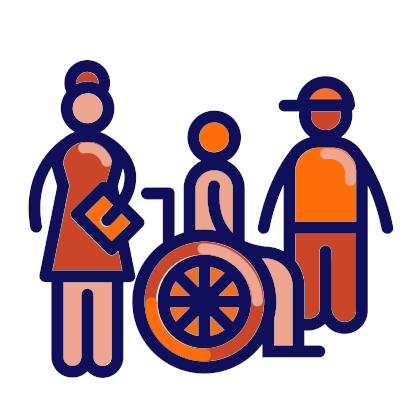Tackling discrimination

Schools can tackle discrimination by promoting democracy, respect for human rights and citizenship.
To ensure that all students’ needs are met equally, schools need to prioritise language and cultural competences, multiperspectivity in history and gender equality. In this way, students can acquire competences for democratic culture, to fulfil their potential in school as well as in society.
Facts & figures
Students with disabilities in Europe have higher early-school leaving-rates than their same-age peers.[1]
Black Caribbean students are three times more likely to be excluded from English schools than white pupils. [2]
A survey of nine EU countries showed that 33% of Roma students were in schools where most pupils were Roma, with 13% in Roma-only schools.[3]
What is discrimination?
Discrimination is treating a person badly or unfairly on account of a personal characteristic, such as national, ethnic or social origin, gender, language, religion, disability or sexual orientation.
There are two basic forms of discrimination:
- Direct discrimination – treating someone less favourably than you treat or would treat another person in the same situation, e.g., a school refusing to admit a student because they are Roma,
- Indirect discrimination – applying a provision, criterion or practice in the same way for all of a group which has the effect of unfairly disadvantaging people in the group who share a particular characteristic, e.g., a school uniform policy banning headgears for girls and boys may unfairly disadvantage Muslim girls and Jewish boys.
Discrimination can occur in almost any aspect of school life, from the attitudes and expectations of teachers to school rules and codes of conduct, selection and grouping practices, curricula, teaching methods and materials, changing facilities, career guidance, canteen food and the physical school environment.
Whatever form it takes – whether it be parallel school systems for different ethnic groups, concentrations of minority or disadvantaged children in the same school, or differential access to educational provision, it means a lower quality of educational experience for the students being discriminated against.
Why is tackling discrimination important at school?
Discrimination is a human rights violation. Article 14 of the European Convention on Human Rights contains a prohibition on discrimination with respect to any of the rights and freedoms guaranteed under the Convention. Article 2 of Protocol No.1 requires the state to ensure that all individuals have access to its formal educational provision.
“No person shall be denied the right to education.”[4]
“The enjoyment of the rights and freedoms set forth in this Convention shall be secured without discrimination on any ground such as sex, race, colour, language, religion, political or other opinion, national or social origin, association with a national minority, property, birth or other status.”[5]
Tackling discrimination is not simply a duty laid on schools by the European Convention of Human Rights, it is also important for student well-being and educational success. Children and young people who are treated unfairly or discriminated against are more likely to have:
- negative attitudes to school
- lower levels of motivation and academic achievement
- a higher risk of dropping out of formal education
- experience of bullying
- mental health problems.
Feeling different or ‘less’ than others can be an isolating experience. Over time it undermines an individual’s capacity for participation in society, e.g., their sense of self-efficacy, openness to other cultures and beliefs, tolerance of ambiguity and flexibility and adaptability - all of which lie at the heart of the Council of Europe Reference Framework of Competences for Democratic Culture.
Lack of opportunity due to discrimination in school also damages society. It intensifies social divisions, fuels xenophobia and intolerance and undermines social cohesion.
“States should adopt a combination of strong anti-discrimination measures and policies that promote more inclusive education systems where all children learn together. This is not a utopian project, but an achievable goal that can ensure more equal treatment of all children and, in the long term, improve social cohesion”[6]
What are the challenges?
One of the challenges facing the tackling of discrimination in schools is a lack of data. European-wide statistics specifically focused on discrimination in schools are scarce. Children with disabilities, for example, do not always appear in national statistics and may be ‘invisible’ to decision-makers, service providers and the public. Such children are particularly vulnerable to discrimination, however, and are often segregated in terms of educational provision.
These are not the only ‘invisible’ minorities in schools. For example, LGBTI students often feel they have to hide their sexual orientation at school to avoid victimisation.
Another key challenge is the existence of negative stereotypes about minority groups among teachers, parents, students and other school stakeholders. Such stereotypes are often deeply embedded in everyday school life and practice, so much so that they are taken as ‘normal’, e.g., stories and images in textbooks that reflect a stereotyped portrayal of the roles of women and men, girls and boys. Stereotypes help to fuel prejudiced and aggressive behaviour between students, lower expectations from teachers and negative attitudes from parents, e.g., refusing to allow their children to be taught alongside refugee or migrant children.
Stereotyping is difficult to root out in schools because its origins lie in wider society. This is exacerbated by the current preponderance of hate speech, fake news and conspiracy theories in digital media, especially social media.
The situation is compounded when minority groups are under-represented on school staff. Students lack role - models and teachers do not have the access to information about or insights into other cultures and ways of life that come with belonging to a more diverse profession. They lack the intercultural competences with which to create inclusive and quality learning environments, e.g., openness to cultural otherness, tolerance of ambiguity, plurilingual skills and knowledge and critical understanding of alternative cultures, religions and histories.
Tackling discrimination is more challenging when there is a lack of dialogue between schools and parents. Often this is on account of language difficulties, but it is also a problem where students’ parents work abroad leaving their children in the charge of elderly relatives or others.
How can schools get active?
Ensuring all learners of any age are provided with meaningful, high-quality educational opportunities alongside their peers requires a whole-school approach.
It begins by schools understanding who might be at risk of discrimination, what they can do to minimise discrimination and how they can support students at risk of discrimination. A good place to start is with an assessment of the current situation, identifying the strengths that exist in the school, but also needs and priorities. Consulting with school stakeholders is essential, especially students and, where possible, parents – e.g., using surveys, questionnaires, focus groups, etc. Given the sensitivities involved there is argument for collecting information on individuals’ experiences of discrimination anonymously.
Based on an assessment of the current situation it is possible to identify immediate priorities for policy development. Priorities will vary with the school, but might include, for example:
- language development
- gender equality
- accessibility of the physical environment
- intercultural competences.
The setting of initial priorities should go hand in hand with professional development for senior leadership teams as well as teaching staff. An element of personal as well as professional reflection is essential to the tackling of discrimination in school. In particular, it is important for school staff to be able to consider their own beliefs and values with regard to discrimination, including their own unconscious biases and prejudices.
Schools can then turn to the longer-term aspiration of creating a culture of non-discrimination. Central to this process is the challenging of negative stereotyping, both in classrooms and around the school. This can be done in a variety of ways, including:
- challenging stereotypes when they are heard
- discussing stereotypes with students
- identifying stereotypes in the curriculum
- highlighting stereotypical images and roles in textbooks
- allocating posts of responsibility equitably
- choosing different ways of dividing up students
- providing a range of role-models
- setting up mechanisms for monitoring incidents of discrimination.
Challenging stereotypes goes alongside the promotion of inclusion and an appreciation of the benefits of diversity in school life. This can take different forms, including:
- using inclusive language
- including human rights, democratic citizenship and intercultural education in the curriculum
- encouraging the discussion of controversial issues
- promoting student voice
- involving students in peer education and peer mediation activities
- welcoming parents and involving them in school decision-making
- forming partnerships with different organisations and groups in the community.
[1] Education section of the The European Disability Forum
[2] Article: UK: Racial discrimination is a reality in schools and classrooms. Education International
[3] EU Fundamental Rights Agency, “Second European Union Minorities and Discrimination Survey (EU-MIDIS II) Roma – Selected findings” (2017).
[4] ECHR, Article 2, Protocol No.1
[6] Position paper: Fighting school segregation in Europe through inclusive education by the Council of Europe Commissioner for Human Rights
 Resources on Tackling discrimination
Resources on Tackling discrimination
 Related schools projects
Related schools projects
Address: Proin Stratopedo StrempeniotI, 56701 Neapoli, Thessaloniki
Country: Greece
Project: Our voice is our power!
 Working language during the project:
Working language during the project:
- Greek
- English
 Themes of the Council of Europe campaign “FREE to SPEAK, SAFE to LEARN - Democratic Schools for All” covered:
Themes of the Council of Europe campaign “FREE to SPEAK, SAFE to LEARN - Democratic Schools for All” covered:
- Making children’s and students’ voices heard
- Addressing controversial issues
- Preventing violence and bullying
- Tackling discrimination
- Improving well-being at school
 Competences from the Reference Framework of Competences for Democratic Culture (CDC) addressed and where / how they were integrated:
Competences from the Reference Framework of Competences for Democratic Culture (CDC) addressed and where / how they were integrated:
- Co-operation skills
Activities and creation of educational material. - Respect
Activities and creation of educational material [eg a radio show that was broadcast by a Greek national radio station (ERT3]) . - Knowledge and critical understanding of the world:politics, law, human rights, culture, cultures, religions, history, media, economies, environment, sustainability
Activities and creation of videos and other educational material about human rights (anti-bullying), culture, cultures and history (Europe and other countries), environment.
 Target group age range:
Target group age range:
- 15-19
 Level of education:
Level of education:
- Upper secondary education
Short description of the project:
This project focuses on the idea of active citizens in the European Union which was implemented in a Senior High School during the school year 2017-2018, within the framework of the "Ambassador School Programme", "Teachers 4 Europe" and eTwinning programmes. Two teachers of different specializations collaborated with students from all grades in order to foster their competences for democratic culture and become active citizens on themes such as human rights, democracy and environment. With the help of experiential techniques and technology, and with the motivation of some older videos and sites/blogs that the two teachers have created in previous years with their older students, they created some new videos, a radio show that was broadcast by a Greek national radio station, some new sites/blogs and other educational material.
 Aims/objectives
Aims/objectives
Τhis project aimed to familiarise pupils with the European Union and the concept of active citizens in the European Union. It invited students and teachers to reflect on current problems (human rights, refugees, environmental problems, bullying, democratic & digital citizenship etc.) and act upon them as active citizens. Moreover, it created opportunities for social interaction of young people by fostering dialogue among students from different countries and developing a mutual understanding.
 Expected results/outcomes
Expected results/outcomes
During the evaluation of the practice, the teachers observed that students: a) managed to successfully process and reformulate the information provided through the project, b) developed their decision-making ability, c) became familiar with modern technology, d) reinforced their active involvement.
The knowledge provided during the activity was related to real life, the protagonists being the students themselves: without their involvement, nothing could be accomplished, and no educational goal could be reached. Both the teachers and the students embraced different ways of perceiving and interpreting reality and committed themselves to using them. More particularly, the students were asked to talk about respect, religious notions and European values and to demonstrate what they can actually do with all they have learned, through their own work.
The project focused on active citizenship, migration, human rights, awareness of policies for migration, cultivating the interdisciplinary spirit among students and teachers, collaboration and resilience and learning the values of respect. The students discussed, criticized, became aware of the current situation and realized that we have to work together for a free, socially just and democratic Europe of the future that places its respect on the environment and humanity as its main priority.
 Changes
Changes
Both the teachers and the students adopted such an attitude that enabled them to view the world in various different ways: to describe it, to interpret it, to check it, to experience it, to analyse it, to depict it, to reenact it. And all this was done in more ways than one, using various “languages”.
Acquired skills: educational material study, digital literacy, inclusion, cultivated empathy through activities, engaged problem solving, critical thinking, improved language skills and international collaboration, encouragement of interest in science, performance–based assessments.
 Challenges you faced
Challenges you faced
The challenges that we faced were to enhance the understanding of students for the important role they play in interpreting the diversity of the "other" through a holistic approach of diversity through research, promotion and study of personal experiences, needs and desires of the students themselves.
As far as our school is concerned, the students were accepted after taking and passing a special examination or currently at random (with a draw) and, therefore, they do not necessarily come from the area around the school, but from various municipal districts. At the very beginning of the school year, an attempt has been made to detect and accommodate the various student learning styles by taking into account the students’ extracurricular activities.
Moreover, we have tried to cultivate European consciousness and identity through the active participation of pupils on European platforms and the empowerment of European values and the acquaintance with the religious, cultural and geographical diversity of Europe and the contact of students with its arts and culture, so that Europe can take a more meaningful approach, especially in the difficult times we are experiencing with fanaticism, nationalism and homogenization.
Finally, an attempt was made to exploit the pre-existing knowledge of pupils. The research hypothesis was that students would be better met in a familiar and popular interface (digital maps) and would feel closer to the new information and European values. Cartographer-students were asked to reconfigure the religious and cultural past of the people of Europe and link it to today.
 Time-frame of the project:
Time-frame of the project:
During the school year 2017-2018 (some parts were created during the school years 2015-16 and 2016-17 and were used as educational material for the school year 2017-18)
 Council of Europe materials on citizenship and human rights education used while preparing or implementing your practice:
Council of Europe materials on citizenship and human rights education used while preparing or implementing your practice:
- Reference Framework of Competences for Democratic Culture
- Living Democracy - manuals for teachers
- Addressing violence in schools through EDC/HRE
- All Different – All Equal
- Managing controversy
- Teaching controversial issues-training pack
- Compass
- Compasito
- Human Rights and Democracy Start with Us – Charter for All
- Freedom(s) - Learning activities for secondary schools on the case law of the European
- How all Teachers Can Support EDC/HRE: A Framework for the Development of Competences
- Multimedia Material (ex. video “Beat Bullying”, series of cartoons “Democracy and Human Rights at School”, video “Corporal punishment at school: how two parents decided to change things”)







